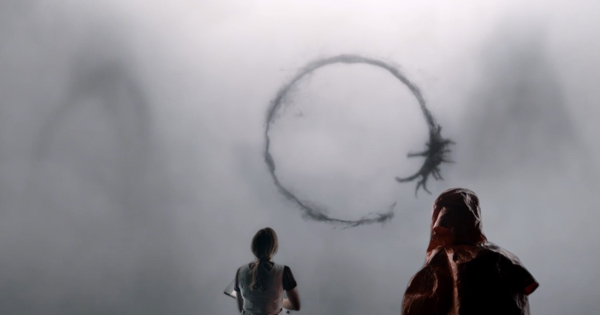Movie review by Greg Carlson
WARNING: The following review reveals plot information. Read only if you have seen “Arrival.”
Following Oscar-nominated breakthrough “Incendies,” filmmaker Denis Villeneuve put together a hat trick of beautifully shot features stylish enough to straddle the line between auteurist individuality/prestige and studio-massaged commercial aspirations. “Prisoners,” “Enemy,” and “Sicario” are now joined by “Arrival,” a cerebral, or ersatz cerebral – depending on your tolerance for beautiful people expressing deep thoughts – science fiction drama in the thematic vein of “Close Encounters of the Third Kind.” Aligned in several ways with recent sci-fi genre exercises embracing self-seriousness over action and adventure, “Arrival” lands somewhere between the mawkishness of “Interstellar” and the mourning mother headspace of “Gravity.”
Amy Adams is Dr. Louise Banks, a brilliant linguist called to service by Forest Whitaker’s Colonel Weber when a dozen massive UFOs descend from the sky to seemingly random locations across the globe. The geographical distribution of the so-called “shells” sets the stage for a tense standoff between political rivals, as power players including China and Russia monitor the sites to see who might blink first. Joined by theoretical physicist Ian Donnelly (Jeremy Renner), Banks interacts with the aliens, desperately struggling to decipher their communication before the military opts to use force.
Villeneuve directs the scenes of human-alien interaction with an exquisite, elegant simplicity that invites us to share Banks’ sense of awe at drawing face to face with intelligent life from another solar system. Separated by a large glass partition that suggests the window of a fog-enshrouded aquarium, the humans are greeted by two Lovecraftian heptapods who spray an inky substance from their extremities as a means of orthography. Dr. Banks and Donnelly decide to call the alien duo Abbott and Costello, even though Kang and Kodos may have been more accurate if on-the-nose monikers, physically speaking.
“Arrival” misses a few minor beats. Both Weber and the other major U.S. government representative, played by Michael Stuhlbarg, fail to register as fully dimensional people. The almost perfunctory cutaways to expository newscasts were done better and more efficiently in the original “The Day the Earth Stood Still,” another film that tests the idea of how humankind struggles to receive a game-changing gift. Some of Banks’ broad and tepid voiceover erases a few IQ points. “Arrival” is not the first time Villeneuve has been accused of the well-worn style-over-substance critique, but I appreciated the meticulous compositions and desaturated palette provided by cinematographer Bradford Young, even if his otherworldly visuals rank a notch lower than those provided by Roger Deakins on “Prisoners.”
Undoubtedly, some viewers will feel cheated by the revelation that the scenes of Banks taking care of her dying daughter are not flashbacks, but are instead flashforwards. We are well-conditioned to accept the former technique as a regular feature in narrative motion picture storytelling. By contrast, the flashforward is deployed much less frequently, and often for the kind of surprise we receive near the conclusion of “Arrival,” in the sense that our presumptions have been wrong and/or we have been deliberately misled. The “trick,” however, might just be the masterstroke of “Arrival,” revealing to the watcher the heptapods’ nonlinear experience of time in parallel to the process by which Banks attains that same knowledge.
